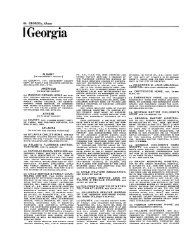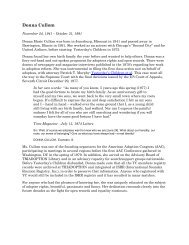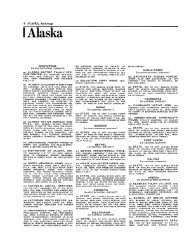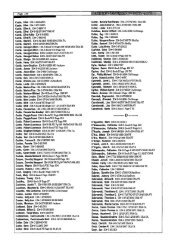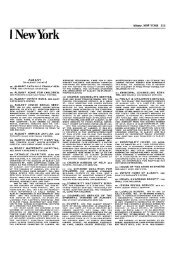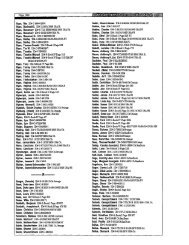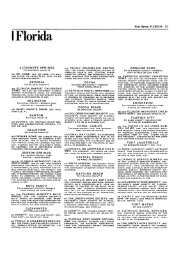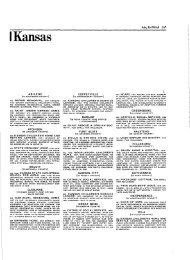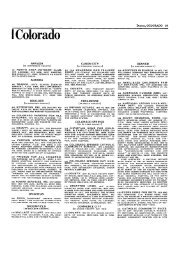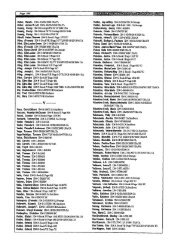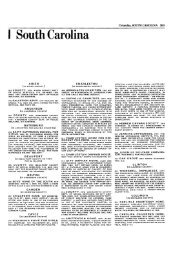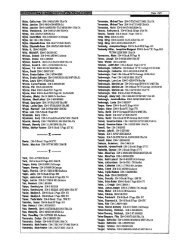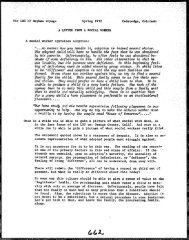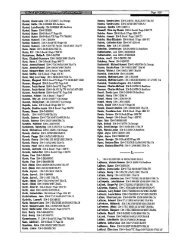Articles Book III - Pg 300-560 (Birthparents) - triadoption
Articles Book III - Pg 300-560 (Birthparents) - triadoption
Articles Book III - Pg 300-560 (Birthparents) - triadoption
Create successful ePaper yourself
Turn your PDF publications into a flip-book with our unique Google optimized e-Paper software.
Family Involvement<br />
VolumeTenlNumbor Fivo 1978 ISSN 1031 9-1443)<br />
- -----<br />
Family threat<br />
Editorial director<br />
by JOHN L. BROWN. FRSH. ACSW, AGPA<br />
JOHN L. BROVVN<br />
FRSH. ACSW. AGPA<br />
Edltor<br />
GLORIA SHEPHARD<br />
Circulation and<br />
production co.ordinator<br />
CHRISTOPHER MORDEN<br />
Photographs<br />
F. ROBERT OPENSHAW<br />
FAMILY INVOLVEMENT JOURNAL<br />
P.O. Box 936,<br />
Station K.<br />
Toronto, Ont.,<br />
Canada<br />
M4P 2H2<br />
Family threat<br />
by John Brown Paye 1<br />
A birthmother looks at ndoptlon<br />
by Stephanie Tay page 12<br />
Early childhood autism<br />
by John Carew page 29<br />
Roviews page 4 7<br />
is published by Canodian Educational Programmas<br />
and is a member of tho<br />
Canadian Periodical Publishers' Association<br />
Thero Is a movement currently in voguo in<br />
North Amorica - and maybe olsowhorc,<br />
but tho movoment in North America is tho<br />
one I am most familiar with - to grant<br />
childron soparato and legal rights. Tharo<br />
hova boon a number of dramatic accounts<br />
in the media of children who, with the holp<br />
of lawyors. hnvo suod their parents for<br />
support, or hava sued adoption agcncios<br />
for not having put thom up for adoption,<br />
otc. Gonoraily, tho plea is that the child is a<br />
soparato baing who has soparoto individual<br />
and legal rights and that those soparato<br />
rights should bo ostablished in law. In<br />
Canada, thcso individual rigtits don't exist<br />
for childron or adults, we exist at tho pleasura<br />
of tho stato. A child has tho samo<br />
rights as any other individual parson has.<br />
but thcso rights havo not boon recognized<br />
in practice. Children havo always boon<br />
treated as though thoy did not hnvo tho<br />
samo legal rights accorded other persons<br />
and, in consequence of that, childron liava<br />
been subioctod to all mannor of cocrcivo<br />
rnaasurcs which forcod thom to submit to<br />
treatment or placomonts that woro inappropriate,<br />
or oven harmful, once thoir own<br />
family was taken out of tho picturo.<br />
bohaviour, was tho least dosirablo and tho<br />
least likoly to hova considoration given to<br />
hini wlion peoplo plannod for his caro and<br />
treatment. Then it would go on up tt~rough<br />
the scalo through nourotic childron.<br />
psychotic childron. n~entally rotordod<br />
children on up to brain damaged childron.<br />
Bocauso if you could identify soma typo of<br />
brain damago, it was moro likely that you<br />
could establish services tlrat gave tho child<br />
more. It was as though the brain damaged<br />
child had an "accoptnblo" handicap. It was<br />
as though ha and his parents wero absolved<br />
from blamn for that handicap and so doserved<br />
batter or morn costly sarvicos.<br />
For many years, vory littlo was dona for tho<br />
mentally retarded child becauso familios<br />
wore ashamed of having a mentally retarded<br />
cliild and often kept thorn hiddan away<br />
at homo. or plocod them in institutions and<br />
triad to forgot about them. But as families<br />
got organizod, tho ralardod child achicvcd 11<br />
tiighor status in torms of nttcntiot~ and cart!<br />
from society - not as a result of pressure<br />
Iron1 lawyers, profcssionals in human services<br />
or govornnicnt. oithor civil scrvatits or<br />
politicians, but as a result of fanlilies<br />
demanding moro support and hclp with tho<br />
spacial needs ol thoir rotardcd child.<br />
Familios organizod, lobbied and demanded<br />
that tho rights of rotardod childron bo<br />
rocogtiizod. Familios aro just now beginning<br />
to gain accoptancu of tho rotardcd chilcl's<br />
right to service within his own family.<br />
This was a matter of groat concorn to us in<br />
our carliar work becauso we roalizod that<br />
not only was the child without lcgnl rights<br />
in practico, but lie liad vory few liurnan<br />
rights. This was, of course, particularly truo<br />
of tho cliild who lied been idont~fied as a<br />
~roblom. tho cliild wlio had ;I dilficultv 01<br />
I<br />
somu kind. All those chilcfron who woro in<br />
arly way deviant were lumped togctlier But always, in our cxpcrienco, the child<br />
that tho dolinquent, or acting out cliild wlio child wlio wasn't rticc and obedient, the<br />
uxprossed his problem througli disruptive child wlio ilctod as if ha oxpactad sonie<br />
VOLUME 10INUMBER 5 1<br />
Contonts copyright @ all rights reserved. If<br />
quoting any of this motoriol acknowledge<br />
mont must be given to author and Family In- within a graduation of acceptability. So who prnser~tod buhaviour problems. tho<br />
volvamont Journal. Permission must be obtainod<br />
for reproduction of more than o few<br />
scntonccs for roview purposos.




